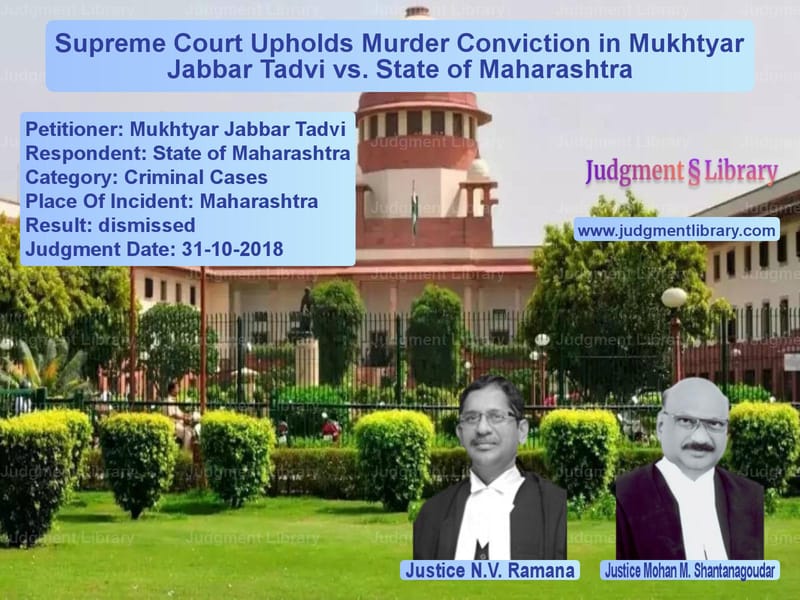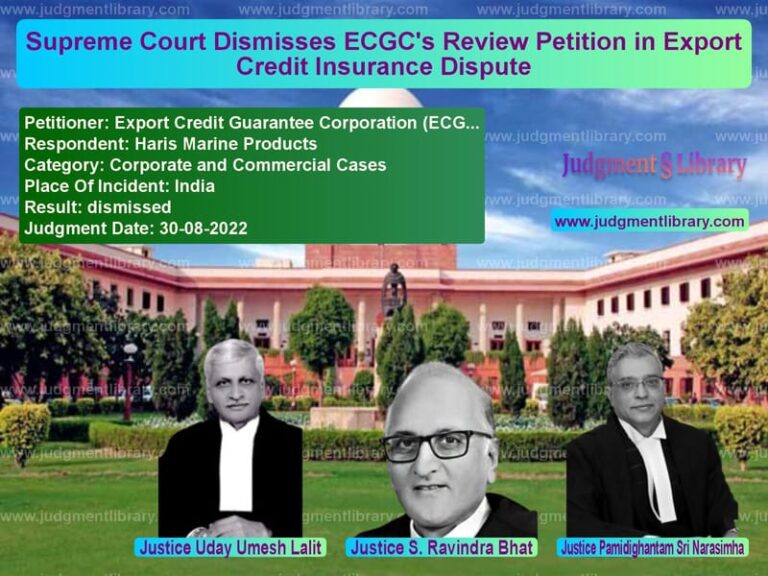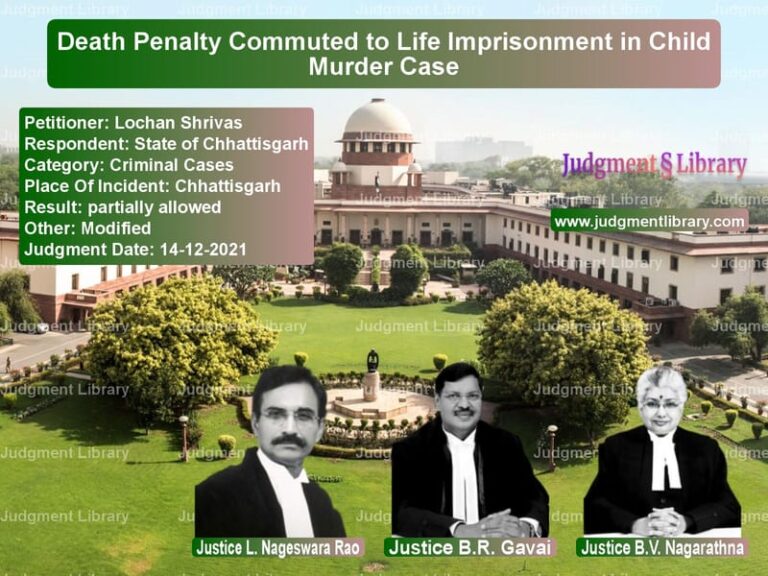Supreme Court Upholds Murder Conviction in Mukhtyar Jabbar Tadvi vs. State of Maharashtra
The Supreme Court of India, in the case of Mukhtyar Jabbar Tadvi vs. State of Maharashtra, upheld the conviction of the appellant under Section 302 of the Indian Penal Code (IPC). The case revolved around the brutal murder of Munir, the son of the informant, in which the prosecution built its case based on circumstantial evidence, dying declarations, and forensic findings. The case holds significant importance in understanding the evidentiary value of dying declarations and the impact of circumstantial evidence in criminal cases.
Background of the Case
The appellant, Mukhtyar Jabbar Tadvi, was accused of murdering Munir by stabbing him in the stomach with a knife. The prosecution alleged that on the night of December 16, 2005, Munir was attacked near his house. His father and wife were present when he, in a severely injured condition, named the appellant as the assailant before collapsing. The appellant fled the scene, leaving behind incriminating evidence.
The Sessions Court convicted the appellant based on circumstantial evidence, and the Bombay High Court upheld the conviction. The appellant then approached the Supreme Court challenging the conviction.
Key Legal Issues
- Whether the circumstantial evidence presented by the prosecution was sufficient to sustain the conviction.
- Whether the dying declaration made by the deceased was reliable and admissible as evidence.
- Whether the recovery of the weapon and forensic findings corroborated the prosecution’s case.
- Whether the appellant was entitled to the benefit of doubt.
Arguments by the Appellant
- The prosecution failed to provide direct evidence linking the appellant to the murder.
- The trial court and the High Court overly relied on circumstantial evidence and a purported dying declaration.
- The possibility of another individual committing the murder was not adequately investigated.
- The prosecution’s case lacked independent witnesses.
Arguments by the State (Respondent)
- The dying declaration was made in the presence of the deceased’s father and wife, making it credible.
- The appellant was seen holding a blood-stained knife immediately after the incident.
- The forensic evidence confirmed that the blood on the recovered knife matched the deceased.
- The appellant fled the scene and remained absconding for several months, indicating his guilt.
Supreme Court’s Observations
The Supreme Court reviewed the case and made the following key observations:
- “The possibility of any other person causing the fatal injuries has been completely ruled out.”
- “The prosecution has established a complete chain of events pointing towards the guilt of the appellant.”
- “The dying declaration, made in the presence of family members, is consistent and trustworthy.”
- “Forensic findings further strengthen the prosecution’s case, leaving no room for doubt.”
Final Judgment
The Supreme Court upheld the conviction and dismissed the appeal. The appellant was sentenced to:
- Life imprisonment under Section 302 IPC.
- A fine of Rs.5,000, with an additional six months’ imprisonment in default of payment.
- The appellant’s absconding from the police for over seven months was also considered an incriminating factor.
Implications of the Judgment
The ruling carries significant legal implications:
- Reliability of Circumstantial Evidence: The judgment affirms that a well-established chain of circumstantial evidence is sufficient for conviction.
- Validity of Dying Declarations: The Court reinforced that dying declarations, if consistent and corroborated, can be relied upon for conviction.
- Absconding as an Incriminating Factor: The Court treated the appellant’s prolonged absconding as a factor confirming his guilt.
Conclusion
The Supreme Court’s judgment in Mukhtyar Jabbar Tadvi vs. State of Maharashtra upholds the principle that circumstantial evidence, along with a reliable dying declaration, can be sufficient for conviction. The ruling reinforces the importance of forensic corroboration and judicial reliance on properly established evidentiary chains. The case serves as an essential precedent in criminal law, reaffirming the admissibility of dying declarations and the strength of circumstantial evidence in securing convictions.
Petitioner Name: Mukhtyar Jabbar Tadvi.Respondent Name: State of Maharashtra.Judgment By: Justice N.V. Ramana, Justice Mohan M. Shantanagoudar.Place Of Incident: Maharashtra.Judgment Date: 31-10-2018.
Don’t miss out on the full details! Download the complete judgment in PDF format below and gain valuable insights instantly!
Download Judgment: Mukhtyar Jabbar Tadv vs State of Maharashtra Supreme Court of India Judgment Dated 31-10-2018.pdf
Direct Downlaod Judgment: Direct downlaod this Judgment
See all petitions in Murder Cases
See all petitions in Bail and Anticipatory Bail
See all petitions in Judicial Review
See all petitions in Judgment by N.V. Ramana
See all petitions in Judgment by Mohan M. Shantanagoudar
See all petitions in dismissed
See all petitions in supreme court of India judgments October 2018
See all petitions in 2018 judgments
See all posts in Criminal Cases Category
See all allowed petitions in Criminal Cases Category
See all Dismissed petitions in Criminal Cases Category
See all partially allowed petitions in Criminal Cases Category







